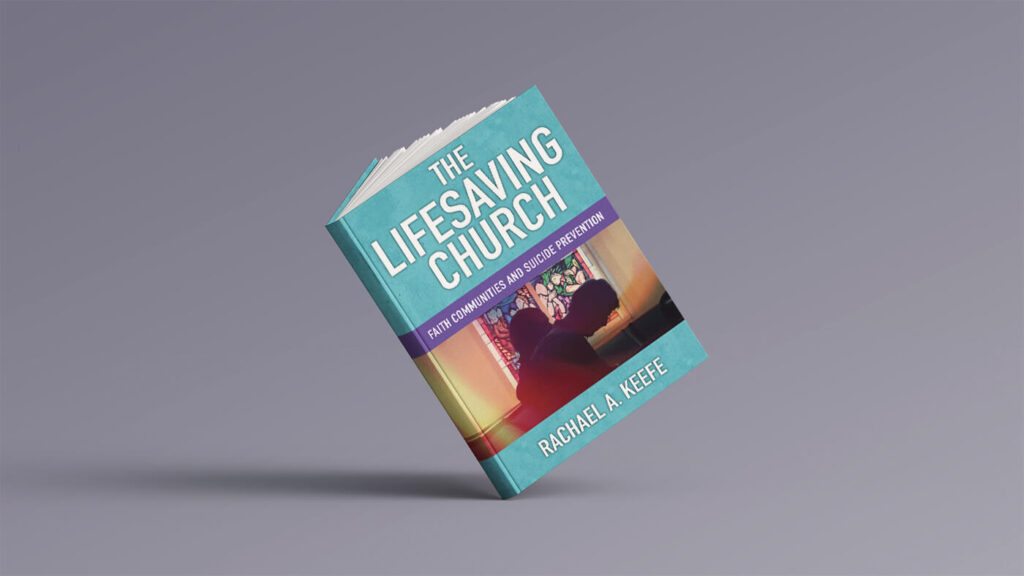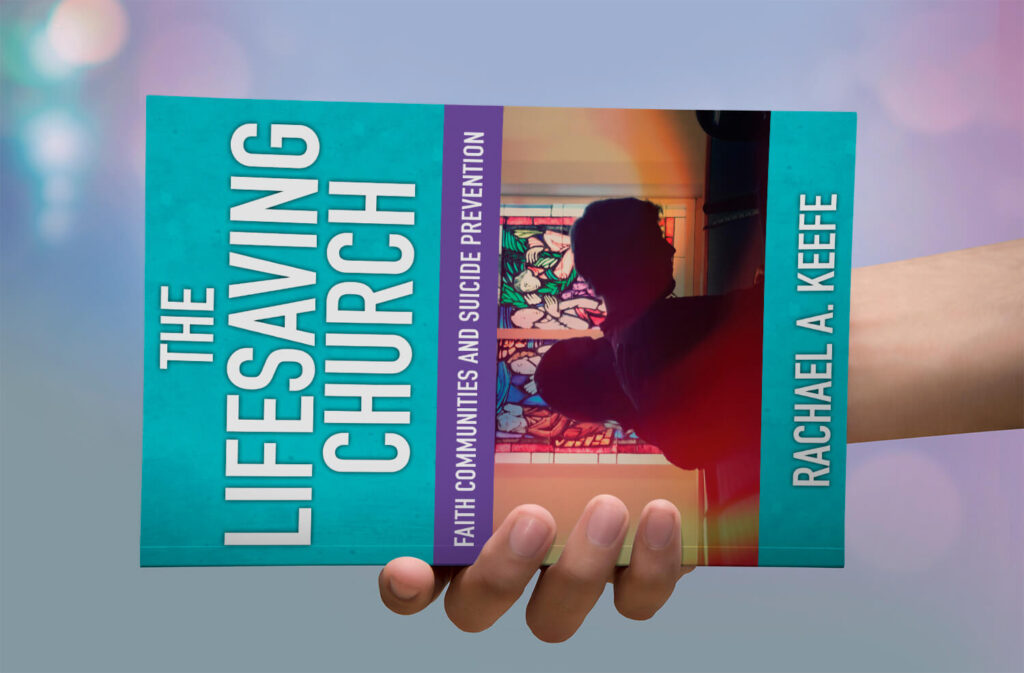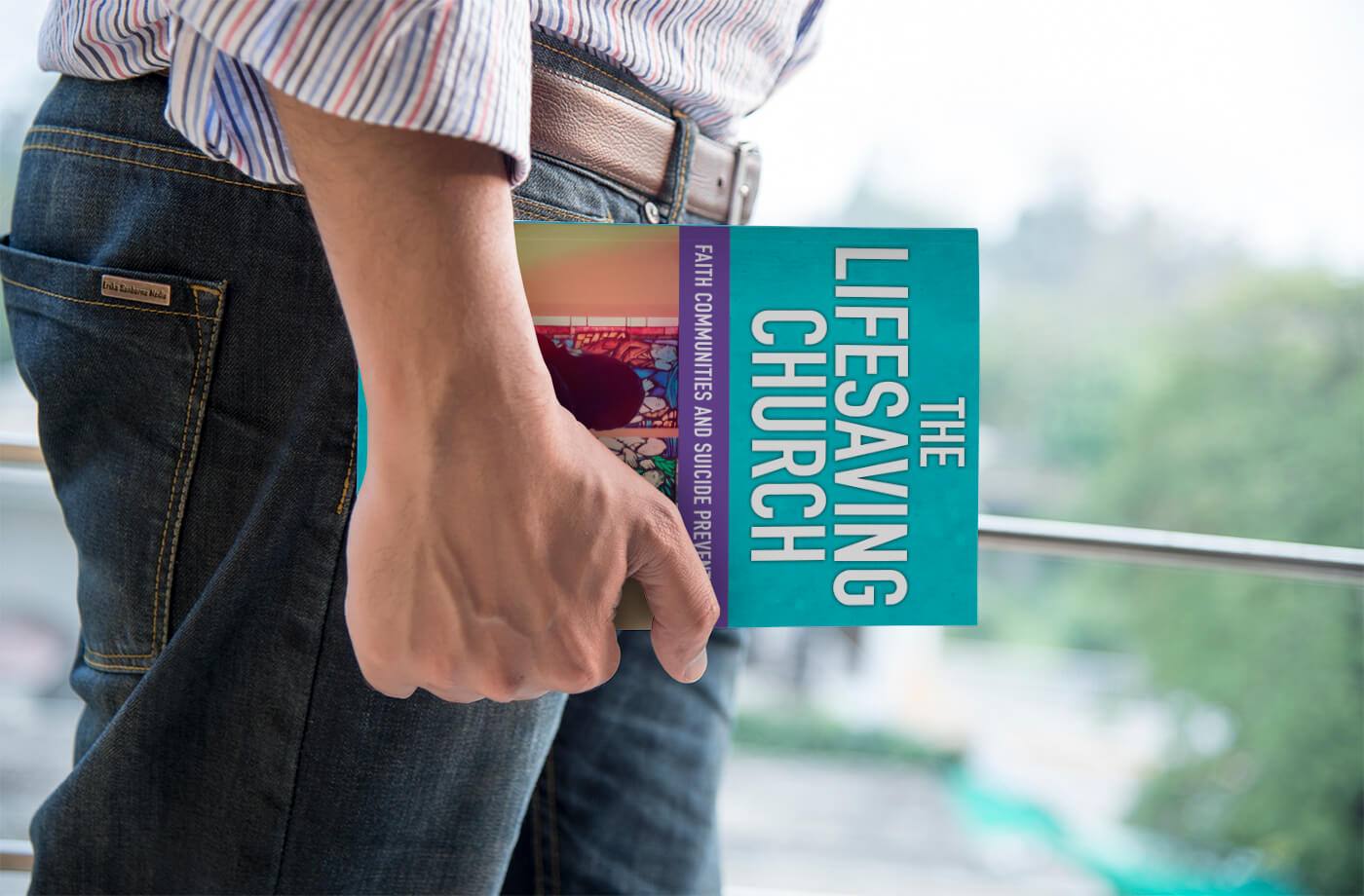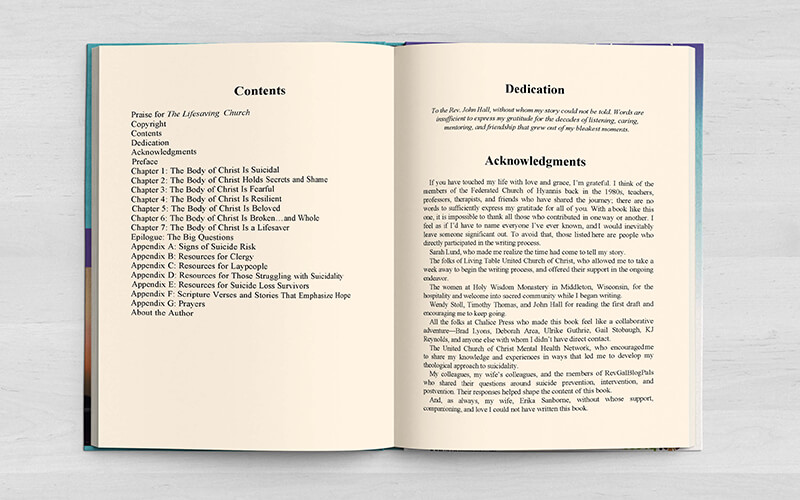Looking for what churches can do for suicide prevention and saving lives? What does the Bible say about suicide? Read on.
This lifesaving work is about suicide prevention and church, and suicide intervention, and suicide postvention – including what to do after a suicide, what not to say at a funeral, safe messaging, and more.
Rachael Keefe is a go-to speaker and faith leader when it comes to the church response to suicide.
She has been a frequent workshop leader and keynote speaker at conferences across the U.S. and as far away as Bangladesh and India, sharing her unique, insightful, hopeful, and faithful response and theology around suicide prevention. The Lifesaving Church is available anywhere books are sold. If you are a pastor and cannot afford to buy this book, contact us. If you need this book, we will buy it for you.
The Lifesaving Church: Faith Communities and Suicide Prevention (Chalice Press, 2018)
From the back cover: Is your church prepared to save lives? Every year, millions of people engage in suicidal activity, including those in our faith communities. Yet the Church remains largely silent around the topics of mental health, depression, and suicide prevention. In this powerful memoir, pastor and suicide survivor Rachael Keefe shatters the silence around suicide to help you and your congregation recognize and respond to those struggling for their very lives in your community.
Note: As an Amazon Associate, I earn a small commission from qualifying purchases at no additional cost to you.

The Lifesaving Church is an unflinchingly faith-filled resource for Christians helping people who are facing mental illness and considering suicide. Rather than engaging with the complexity of mental illness, too often the church simply clings to the belief that everything is okay. But when lives are at stake, avoidance is not an option. Rachael A. Keefe calls on Christians to understand mental health, recognize the signs of suicide risk, and care deeply for one another.
– Foreword Reviews
Churches can help those experiencing mental health struggles
The Editor at The Faith Leader invited Rachael to write a piece entitled, Ten Ways to Be a Lifesaving Church During this Pandemic.
“Five months into pandemic restrictions and even the most positive among us are now realizing that it is going to be a long while before a new normal emerges. Congregations are meeting online or outside…We are wondering what fall programming will look like, and some of us are already thinking about Advent and Christmas. How do we make these special services meaningful online? There is so much to think about as this unusual summer draws to an end. However, the most important questions are not about programming or even whether synchronous or asynchronous worship is best. The most important question to be asking right now is this…”

witness to perserverance and hope
“One compelling lesson evident in Keefe’s unsettling memoir is that the scars of childhood bullying, abuse, and neglect linger for a lifetime. Another is that even one hospitable minister, teacher, counselor, or especially in her case an ordinary faith community, can make all the difference in rescuing and revitalizing that wounded child and child-within. In an era of relentless headlines of anxiety and despair, The Lifesaving Church arrives on the scene as a welcome—and welcoming—witness to perseverance and hope.” —Robert C. Dykstra, professor, Princeton Theological Seminary
a powerful book
“The Lifesaving Church is a powerful book about suicide prevention that every church leader needs to read. Through compelling and courageous storytelling, followed by practical steps that you can do today, this book is a guide that will help churches fulfill their mission to save lives.” —Sarah Griffith Lund, First Congregational Church of Indianapolis and author of Blessed Are the Crazy and Blessed Union
a spiritual and practical guide
“Keefe has offered us a fearless telling of her own story of struggle and hope, of pain and healing, and of betrayal and redemption. She has used her experiences of suicidal thoughts (and an attempt), a persistent eating disorder, and a deep ‘psychache’ to weave a theology of the Church and its purpose of saving lives. Her story serves as both a spiritual and practical guide to congregations as they seek to be a healing and hopeful presence to all they serve, especially those struggling with suicide, addictions, and a sense of separation from God, neighbor, and self. The book includes practical suggestions as well as multiple resources in the appendices.” —Christie Cozad Neuger, professor emerita, Brite Divinity School
options for preventing and responding to suicide
“Keefe courageously tells her story of pain and woundedness and the miracle of transformation that she found in her faith community. This is not just her story. She provides several concrete suggestions for mental health ministry and congregational care. She offers options for preventing and responding to suicide that move beyond platitudes or clichés. She is witness to Christ’s promise that exposing her wounds to her faith community, the Body of Christ, will lead to redemption. Once redeemed, Keefe’s pain became wisdom. She has been able to use her personal flaws as tools to understand and offer healing and compassionate space to others.” —David W. McMillan, clinical and community psychologist
Preaching About Suicide Prevention
The Editor of Working Preacher invited Rachael to write an article on this challenging, yet immeasureably important topic. Keefe writes, “Before preaching on suicide, it is essential that preachers examine their own beliefs and theology around suicide. If we do not critically assess our own beliefs, it is much more likely that we will actively or passively contribute to someone’s suicidal behavior or suicide death…”
“This book weaves the power of Keefe’s personal story with theological and psychological wisdom. Suicidal behavior, self-harm, eating disorder, depression, and adverse (abusive and neglected) childhood experiences are realities that connect with her experience of the embodied love of God. This book breaks the silence with her honesty and the depth of her faithfulness and guides faith communities to embody the unconditional love of the divine. ‘God is not a fan of suicide,’ is a wallop of grace that engages us in the conversation.” —Alan Johnson, Chair, National United Church of Christ Mental Health Network
“At last, a healthy, soul-stirring resource for starting a conversation about suicide in the church! Through a courageous personal testimony, Keefe reminds us that no one is outside of God’s reach, and calls the church to return to the heart of its DNA as an institution of love and radical acceptance. Keefe proves that vulnerability and raw truth telling, coupled with professional insight and genuine unconditional love, is our only hope if we truly are to become The Lifesaving Church.” —Angela Whitenhill, Manager, Mental Health Initiative, National Benevolent Association (Christian Church/Disciples of Christ)
“What does the Bible say about suicide?”
“God does not need our help saving souls. God needs our help saving lives.” —Rachael Keefe
“Keefe offers a timely and relevant introduction to what it means to be mindful and attentive to the realities of suicide in our midst. This is an aspect of ministry that has certainly been under addressed. She shares her personal journey, which has involved suicidal realities as well as gender realities, to alert communities of faith to their critical role in responding to people who may be overlooked in their day-to-day living. Her brave revelations of her journey toward healing can be a needed inspiration to those who think they are alone in their life situations. Her voice throughout her narration is particularly powerful. She weaves personal reflections with theological insights to provide hope for those struggling with similar issues. Because she speaks from personal experience, her confession is compelling and inspiring for others who may be dealing with all too similar situations. Particularly helpful are her appendices, which give practical instruction for those dealing with issues of suicide. Her wisdom is instructive for counseling families and friends affected by suicidal relations. Also helpful are her keen insights into the faith and psychological dynamics that are a part of suicidal realities.” —Sharon Thornton, professor emerita, Andover Newton Theological School and author of Broken Yet Beloved
Get your copy of The Lifesaving Church today. If you are doing a group study, contact Rachael about meeting with your group for a structured, personalized discussion session as follow-up. It is time for us to become the lifesaving church.




